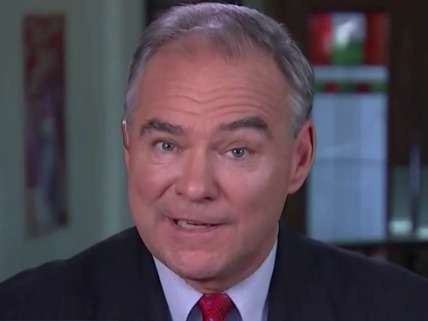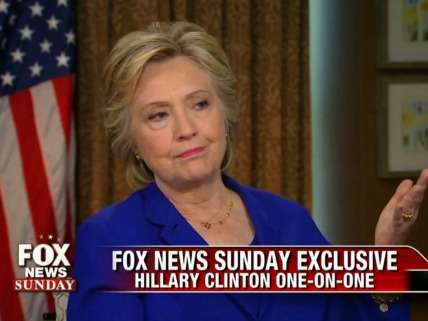Kaine Says Clinton Wasn't Lying About Her Emails—Just 'Talking Past' Her Interviewer
The transcript clearly shows otherwise.

Appearing on Meet the Press yesterday, Democratic vice presidential candidate Tim Kaine suggested that "Chris Wallace and Hillary were sort of talking past each other last week," when Clinton falsely told the Fox News Sunday host that FBI Director James Comey had confirmed she was "truthful" in her statements about her use of a private email server as secretary of state. Instead of mitigating Clinton's whopper, Kaine's defense suggests he aspires to be just as slippery as his running mate.
Wallace began his question to Clinton by playing video of her making three public statements about her State Department emails that the FBI found to be false: 1) that there was no classified information in them, 2) that there was no information in them that was classified at the time, and 3) that none of the email was marked as classified. Wallace prefaced the video by saying he was asking her about "what you told the American people." After playing the video, he noted that "FBI Director James Comey said none of those things that you told the American public were true." Even though Wallace was clearly asking Clinton whether she had been truthful with the American public, she chose to answer a different question: whether she had lied in her interview with the FBI. "Director Comey said my answers were truthful," she said, "and what I've said is consistent with what I have told the American people, that there were decisions discussed and made to classify retroactively certain of the emails."

What Comey actually said was that he did not have any basis to charge Clinton with deliberately misleading the FBI, which is a felony that hinges on intent. Comey's statement does not mean everything Clinton told the FBI was accurate, since she could have said false things she believed were true. It certainly does not mean that everything she told the public about the emails was true, which we know is not the case. Clinton nevertheless implied that escaping a charge of lying to federal agents was tantamount to demonstrating that her public statements about the emails were true, since "what I've said is consistent with what I have told the American people." Then she repeated one of her false statements, suggesting that anything secret in the emails was classified retroactively, even though Comey said "110 emails in 52 email chains have been determined by the owning agency to contain classified information at the time they were sent or received [emphasis added]."
Kaine wants us to believe these missatements resulted from some sort of misunderstanding:
I think Chris Wallace and Hillary were sort of talking past each other last week. She was saying what Director Comey acknowledged to be true, that, when she spoke to the FBI, when she was talking to the FBI, the FBI thought her answers in that setting were truthful. Chris might have been asking her a different question.
It is crystal clear what question Wallace was asking Clinton, and it's not his fault she deliberately chose to answer a different one. But even in doing that, she was too clever by half, since she ended up saying that 1) everything she told the FBI was true, 2) what she told the FBI was the same as what she said in her public statements, and 3) everything she said in her public statements therefore must have been true. Comey, for his part, has repeatedly and pointedly declined to express a judgment about the truth of Clinton's public statements. But his investigation clearly showed they were not true. The only defense left to Clinton is that she thought they were true at the time. Yet she persists in saying, contrary to all the evidence, that the statements were "truthful," meaning not just sincere but accurate.
Even last Friday, when Clinton allowed that she may have "short-circuited" in her response to Wallace, she repeated the very same claim that earned her Four Pinocchios from Washington Post fact checker Glenn Kessler:
Director Comey had said that my answers in my FBI interview were truthful. That's really the bottom line here. And I have said, during the interview and in many other occasions over the past months, that what I told the FBI, which he said was truthful, is consistent with what I have said publicly.
Clinton also suggested that "Chris Wallace and I were probably talking past each other"—the same demonstrably false defense that Kaine offered yesterday. As Peter Suderman noted on Friday, the exchange with Wallace "was typical of Clinton: Not only were her initial statements misleading, so was her attempt to explain those statements." Likewise her attempts to explain those explanations, although I think misleading is too kind a description at this point. It is possible that Clinton, in her initial public statements about her emails, was merely reckless with the facts, saying what she hoped was true, rather than deliberately deceptive. But now that it's clear those statements were not true, insisting they were is simply a lie. Saying it's not is also a lie, as is denying the falsity of that claim. Although Clinton does not prevaricate with the same panache as her Republican opponent, her meta-meta-meta-lies are a thing to behold.



Show Comments (75)